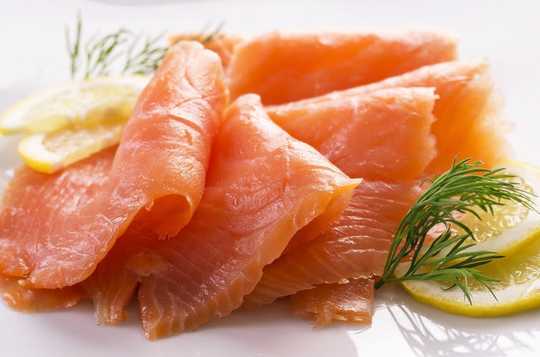
Smoked salmon has been named as the likely source of the recent listeria infections. from www.shutterstock.com
Two people in Victoria and New South Wales have died after eating smoked salmon contaminated with listeria, health authorities report. Both were over 70 and had underlying health conditions.
Health authorities are also investigating a non-fatal Queensland case.
Although Australia’s chief medical officer has not confirmed smoked salmon is behind these three cases, he says this is the “likely source”.
So what is listeriosis, who’s at risk and what can we do to prevent getting sick?
Get The Latest By Email
What is listeria?
Listeriosis is caused by eating food contaminated with a bacterium called Listeria monocytogenes. It’s an uncommon illness but can be deadly if it causes septicaemia (blood poisoning) or meningitis (inflammation of the membranes around the brain).
The elderly are particularly susceptible to listeriosis, as are pregnant women and their fetuses, and those with weakened immune systems.
Past outbreaks have been linked with rockmelon, raw milk, soft cheeses, salads, unwashed raw vegetables, cold diced chicken, pre-cut fruit and fruit salad.
How does it spread?
Listeria is found widely in soil, water and vegetation, and can be carried by pets and wild animals. Listeria contamination of food can occur in restaurants and home kitchens, where the bacterium can be found, and spread, in areas where food is handled.
Contamination levels of raw fish, including salmon, tend to be low. Contamination can occur at any point along the food production chain. It can occur at the food processing stage, for instance in machines used in salting, skinning and slicing fish.
Listeria has also been found in smoked fish products. It is not possible to produce cold-smoked fish that is consistently free from listeria. This is because cold smoking does not involve cooking the fish by heat during the smoking process in order to produce the characteristic delicate texture. In contrast, hot smoking, which is carried out a higher temperature but leaves a less moist and firm texture, kills off listeria.
Manufacturers of cold-smoked fish try to ensure levels of listeria are low. They do this by obtaining product from producers that have a history of non-contaminated fish, freezing, restricting shelf-life time or by using preservatives.
But Listeria monocytogenes is quite a hardy bacterium. It can survive at refrigerated temperatures; viable listeria has been found in vacuum-packed smoked salmon at 4℃.
Listeria also has mechanisms to survive acidic environments such as the stomach, and to grow in oxygen-free environments. Temperatures of 74℃ or greater are needed to kill it.
What are the symptoms?
Eating foods that contain listeria won’t necessarily make you sick. It can survive in the body, moving between cells (human phagocytes) for a long time. This is, in part, why there can be a long “incubation period” between ingestion and onset of illness. This can be as long as 70 days but is usually around three weeks.
Symptoms include fever, muscle aches and gastrointestinal problems such as nausea, vomiting and diarrhoea.
In severe cases, symptoms can include collapse and shock, particularly if there is septicaemia. If the infection has spread to the central nervous system, more worrying symptoms will occur, such as headache, stiff neck, confusion, seizures and the person may go into a coma. In such cases, the fatality rate is as high as 30%.
In pregnant women, the bacteria are thought to cross the lining of maternal blood vessels and then enter the fetal circulation of the placenta. Infection during pregnancy can lead to miscarriage, stillbirth and newborn infections.
Treatment for confirmed infections involves antibiotics and supportive measures such as intravenous fluids for dehydration.
When infection does occur in pregnancy, the early use of antibiotics can often prevent infection of the fetus or newborn.
But even with very prompt treatment, infections can be deadly in high-risk groups.
Why are some groups at higher risk?
Pregnant women are a special group known to be at higher risk for listeriosis. The underlying mechanisms for why pregnant women are susceptible to listeriosis are not well understood but it’s thought an altered immune system is involved.
People with weakened immune systems, such as those on cancer treatment or medications that suppress the immune system, are more susceptible to developing listeriosis because their bodies are less able to fight off the bug.
Newborn babies are also extremely vulnerable as their immune systems have not yet matured, as are the elderly, whose immune systems are declining.
How can you prevent listeriosis?
Remain vigilant for alerts from health regulatory authorities such as Food Standards Australia New Zealand and state public health authorities.
Not everyone needs to stay clear of smoked salmon products but those in a higher risk group should. And once a specific product has been identified as a source of a food-borne illness outbreak such as listeria, then throw it away.
Here are some practical things you can do to prevent the spread of listeria:
- thoroughly cook raw food from animal sources, such as beef, lamb, pork and poultry
- wash raw vegetables and fruit thoroughly before eating
- use separate cutting boards for raw meat and foods that are ready to eat
- wash your hands with soapy water before and after preparing food
- wash knives and cutting boards after handling uncooked foods
- wash your hands after handling animals.
If you are at greater risk for listeriosis, consider avoiding:![]()
- raw and uncooked smoked seafood such as smoked salmon
- pre-cut melons such as rockmelon or watermelon
- pre-packed cold salads including coleslaw and fresh fruit salad
- pre-cooked cold chicken, cold delicatessen meats, pâté
- unpasteurised milk or milk products, soft cheeses (such as brie, camembert, ricotta or blue-vein)
- sprouted seeds
- raw mushrooms.
About the Author
Vincent Ho, Senior Lecturer and clinical academic gastroenterologist, Western Sydney University
This article is republished from The Conversation under a Creative Commons license. Read the original article.
books_health










